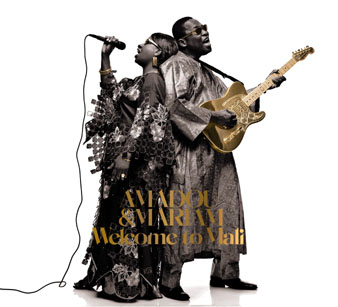Amadou & Mariam's latest album, Welcome to Mali, is set for US release on Nonesuch tomorrow. The duo is the subject of a number of feature-length articles about changing perceptions in the West of African musics beyond "world music." The New York Times places them "among the world’s most renowned African musical acts" and says the new album is "less an abandonment of the group’s culture than an updating of it." The Los Angeles Times cites the success of Amadou & Mariam, who "helped define the current African shift," and of Youssou N'Dour, Oumou Sangare, and Rokia Traoré, as examples that "the American cliché of African music is falling apart—or, really, exploding." Detroit Free-Press gives Welcome to Mali four stars, calling it "a spirited invitation to dance away those recession-induced blues and welcome spring ... This is a feel-good album. Don't miss it."
Amadou & Mariam's latest album, Welcome to Mali, the follow-up to their 2005 breakthrough Dimanche à Bamako, is set for US release on Nonesuch tomorrow. The husband-and-wife duo are the subject of a number of feature-length articles of late, including one in the New York Times and one in the Los Angeles Times about changing perceptions in the West of the diversity of African musics beyond the monolithic concept of "world music."
In the New York Times, reporter Will Hermes tries out an unofficial remix of the Damon Albarn–produced album opener, "Sabali," by Brooklyn's Theophilus London, on the couple, who are happily unfazed and recognize it as a compliment to their work. Hermes sees it as an example of the accessibility and wide appeal of two musicians who "are among the world’s most renowned African musical acts ... The duo’s success may be about universal pop attributes as much as cultural exoticism."
That universality is influenced by changes both in the content and in Western exposure to a diverse array of African artists. "Like its predecessor Welcome to Mali is a pop-rock record grown from African terroir," says Hermes, "and it arrives as the continent’s musical exports are displaying an aesthetic shift," experimenting with sound palettes shared and sampled through technology across cultures. "Together these factors have helped dispel the notion of world music as a folk-rooted category geared strictly toward older listeners."
The appeal of Amadou & Mariam's own brand of music fits naturally into this dynamic shift. "Hooky and groove-oriented enough to appeal to dance-rock and jam-band fans," says Hermes, "the duo’s music has been championed in mainstream outlets as well as trend-spotting indie-rock Web sites like Stereogum.com and the hippie-rock news site Jambase.com. (Mr. Bagayoko is a hot blues-rock-style improviser on guitar.)"
Nevertheless, he concludes, "the album is less an abandonment of the group’s culture than an updating of it."
Read the complete article at nytimes.com.
---
Los Angeles Times Pop Music Critic Ann Powers also sees the US release of Welcome to Mali as an opportunity for Western audiences to rethink preconceived notions of a singular African sound.
"What does the phrase 'African music' mean to most Americans," she asks. "Light-spirited guitar lines made danceable by polyrhythmic talking drums; big bands led by tall men in regal garb, smiling as women in bright headdresses dance behind them."
The success of Amadou & Mariam is just one example of how a very different image and sound from Africa supports the notion that "the American cliché of African music is falling apart—or, really, exploding. Greats like Senegal's Youssou N'Dour and Mali's Oumou Sangare maintain fruitful careers within the usual avenues of what's become known as 'world music.'"
Powers also cites fellow Malian Rokia Traoré as an artist who creates and performs outside traditional expectations. Traoré says she has done so because her abilities lie elsewhere, as exhibited on Tchamantché, described by Powers as "her gorgeous, electric-guitar-focused second album for Nonesuch."
The article goes on to say that it was Amadou & Mariam's Dimanche à Bamako that "helped define the current African shift" and suggests that the new album "takes their 'Afro-blues' sound into unexpected corners." Collaborations with a producer like Manu Chao on the former and artists like Damon Albarn and Somali-born American rapper K'Naan on the latter show their "ability to not simply cross but seemingly erase musical boundaries."
Of the new record, Powers writes: "Its sound is boisterous—the fans who discover Amadou & Mariam opening for Coldplay this summer will dance their sneakers off—and brilliantly multifaceted, leading back to the Malian folkways that centuries ago inspired the blues, and reflecting a hyperactively interconnected future."
Mariam says the importance of this cross-cultural appeal and of interconnectivity is more than musical. "We don't want people to see Africa as only one picture," she tells the Los Angeles Times. "We don't want them to see Africa as a place under war at all times. There are plenty of good things in Africa, the human relationships, the solidarity, the tradition, the stories."
The extensive article can be found at latimes.com.
---
The Wall Street Journal's John Jurgensen spoke with Amadou & Mariam about the new record and focuses on three album tracks in particular: "Ce N'est Pas Bon," which marries its political message with "a crunching rock climax"; "Djuru," another socially conscious song and a guest turn from "Mali star Toumani Diabaté"; and "Je Te Kiffe." There's more at online.wsj.com.
---
Detroit Free-Press gives the new album four stars. "Amadou & Mariam give us another blast of soulful world music" on the new album, says reviewer Martin Bandyke, who goes on to describe it as "a spirited invitation to dance away those recession-induced blues and welcome spring."
Bandyke cites the album's "call-and-response vocals, rhythmic guitars and hypnotic beats" as "hallmarks of Amadou & Mariam's sound, and all are delivered with a steady, percolating groove ... [T]his is an album designed for the dance floor." The reviewer concludes: "This is a feel-good album. Don't miss it."
Read the four-star review at freep.com.
- Log in to post comments


